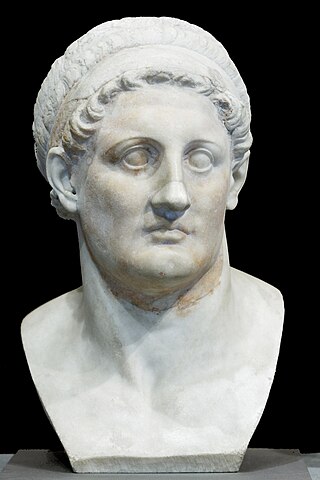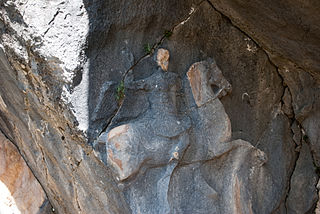Related Research Articles

This article concerns the period 329 BC – 320 BC.
Year 321 BC was a year of the pre-Julian Roman calendar. At the time, it was known as the Year of the Consulship of Calvinus and Caudinus. The denomination 321 BC for this year has been used since the early medieval period, when the Anno Domini calendar era became the prevalent method in Europe for naming years.

Ptolemy I Soter was a Macedonian Greek general, historian, and successor of Alexander the Great who went on to found the Ptolemaic Kingdom centered on Egypt. Ptolemy was basileus and pharaoh of Ptolemaic Egypt from 305/304 BC to his death in 282 BC, and his descendants continued to rule Egypt until 30 BC. During their rule, Egypt became a thriving bastion of Hellenistic civilization and Alexandria a great seat of Greek culture.

Seleucus I Nicator was a Macedonian Greek general, officer and successor of Alexander the Great who went on to found the eponymous Seleucid Empire, led by the Seleucid dynasty. Initially a secondary player in the power struggles following Alexander's death, Seleucus rose to become the total ruler of Asia Minor, Syria, Mesopotamia, and the Iranian plateau, assuming the title of basileus (king). The Seleucid Empire was one of the major powers of the Hellenistic world, until it was overcome by the Roman Republic and Parthian Empire in the late second and early first centuries BC.

Perdiccas was a Macedonian general, successor of Alexander the Great, and regent of Alexander's empire after his death. When Alexander was dying, he entrusted his signet ring to Perdiccas. Initially the most pre-eminent of the successors, Perdiccas effectively ruled Alexander's increasingly unstable empire from Babylon for three years, until his assassination, as the kings he ruled for were incapable.

Antigonus I Monophthalmus was a Macedonian Greek general and successor of Alexander the Great. A prominent military leader in Alexander's army, he went on to control large parts of Alexander's former empire. He assumed the title of basileus (king) in 306 BC and reigned until his death. He was the founder of the Antigonid dynasty, which ruled over Macedonia until its conquest by the Roman Republic in 168 BC.

Alexander IV, sometimes erroneously called Aegus in modern times, was the son of Alexander the Great and Princess Roxana of Bactria.

Antipater was a Macedonian general, regent and statesman under the successive kingships of Philip II of Macedon and his son, Alexander the Great. In the wake of the collapse of the Argead house, his son Cassander eventually ruled Macedonia as a king in his own right.

The Wars of the Diadochi or Wars of Alexander's Successors were a series of conflicts fought between the generals of Alexander the Great, known as the Diadochi, over who would rule his empire following his death. The fighting occurred between 322 and 281 BC.

Craterus or Krateros was a Macedonian general under Alexander the Great and one of the Diadochi. Throughout his life, he was a loyal royalist and supporter of Alexander the Great.
Perdiccas was a general of Alexander the Great.
Attalus, son of Andromenes from Tymphaia, and one of Alexander's officers, was accused with his brothers, Amyntas and Simmias, of having been engaged in the conspiracy of Philotas in 330 BC, but was acquitted, together with his brothers. In 328, Attalus was left with Polyperchon and other officers in Bactria with part of the troops, while the king himself marched against the Sogdians. He accompanied Alexander in his expedition into India, and was employed in several important duties. During Alexander's last illness in 323, Attalus was one of the seven chief officers who passed the night in the temple of Serapis at Babylon, in order to learn from the god whether Alexander should be carried into the temple.

Alcetas, was the brother of Perdiccas and the son of Orontes from Orestis. He is first mentioned as one of Alexander the Great's generals in his Indian expedition.
Arrhidaeus or Arrhidaios, one of Alexander the Great's generals, was entrusted by Ptolemy to bring Alexander's body to Egypt in 323 BC, contrary to the wishes of Perdiccas who wanted the body sent to Macedonia. On the murder of Perdiccas in Egypt in 321 BC, Arrhidaeus and Peithon were appointed temporary commanders in chief, but through the intrigues of the queen Eurydice they were obliged to resign soon afterwards their office at Triparadisus in Northern Syria. On the division of the provinces which was decided by those attending Triparadisus, Arrhidaeus obtained the Hellespontine Phrygia. In 319 BC, after the death of Antipater, Arrhidaeus made an unsuccessful attack upon Cyzicus; and Antigonus gladly seized this pretext to require him to resign his satrapy. Arrhidaeus, however, refused to resign and shut himself up in Cius.
Nicaea was a Greek Macedonian noblewoman and was a daughter of the powerful regent Antipater. Her mother's name is unknown. She was born and raised in Macedonia while her father was governor of Macedonia during the reign of Greek King Alexander the Great.
Archon was a Pellaeon, appointed satrap of Babylonia after the death of Alexander the Great in 323 BC. He is probably the same as the son of Cleinias mentioned in the Indian expedition of Alexander. He perished in 321 BC in a fight against Dokimos. An inscription in Delphi shows that Archon had taken part in both the Isthmian and Pythian Games of 333 to 332 BC, won some horse-races.
Philotas was a Macedonian officer in the service of Alexander the Great, who commanded one taxis or division of the phalanx during the advance into Sogdiana and India. It seems probable that he is the same person mentioned by Curtius, as one of those rewarded by the king at Babylon for their distinguished services. There is little doubt also, that he is the same to whom the government of Cilicia was assigned in the distribution of the provinces after the death of Alexander, 323 BC. In 321 BC, he was deprived of his government by Perdiccas and replaced by Philoxenus, but it would seem that this was only in order to employ him elsewhere, as we find him still closely attached to the party of Perdiccas, and after the death of the regent united with Alcetas, Attalus, and their partisans, in the contest against Antigonus. He was taken prisoner, together with Attalus, Docimus, and Polemon, in 320 BC, and shared with them their imprisonment, as well as the daring enterprise by which they for a time recovered their liberty, when they took possession of their prison, overpowering their guards. He again fell into the power of Antigonus, in 316 BC.

Neoptolemus was a Macedonian officer who served under Alexander the Great.
The Partition of Triparadisus was a power-sharing agreement passed at Triparadisus in 321 BC between the generals (Diadochi) of Alexander the Great, in which they named a new regent and arranged the repartition of the satrapies of Alexander's empire among themselves. It followed and modified the Partition of Babylon made in 323 BC upon Alexander's death.
Eurydice, often referred to as Adea Eurydice, was the Queen consort of Macedon, wife of Philip III and daughter of Amyntas IV and Cynane.
References
- Heckel, Waldemar, ed. (2006), Who's Who in the Age of Alexander the Great, p. 42, ISBN 978-1-4051-1210-9